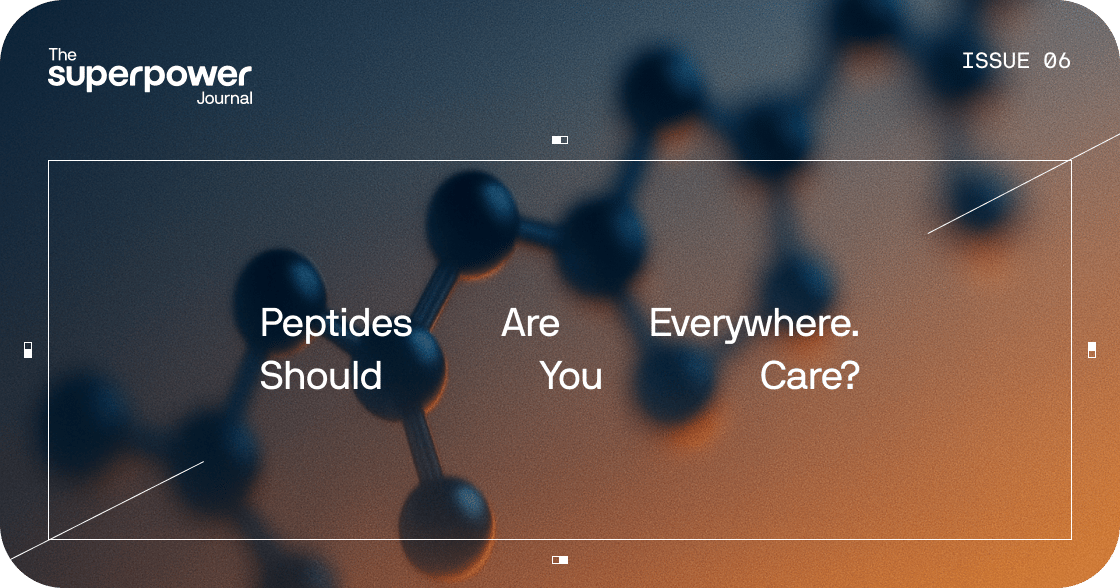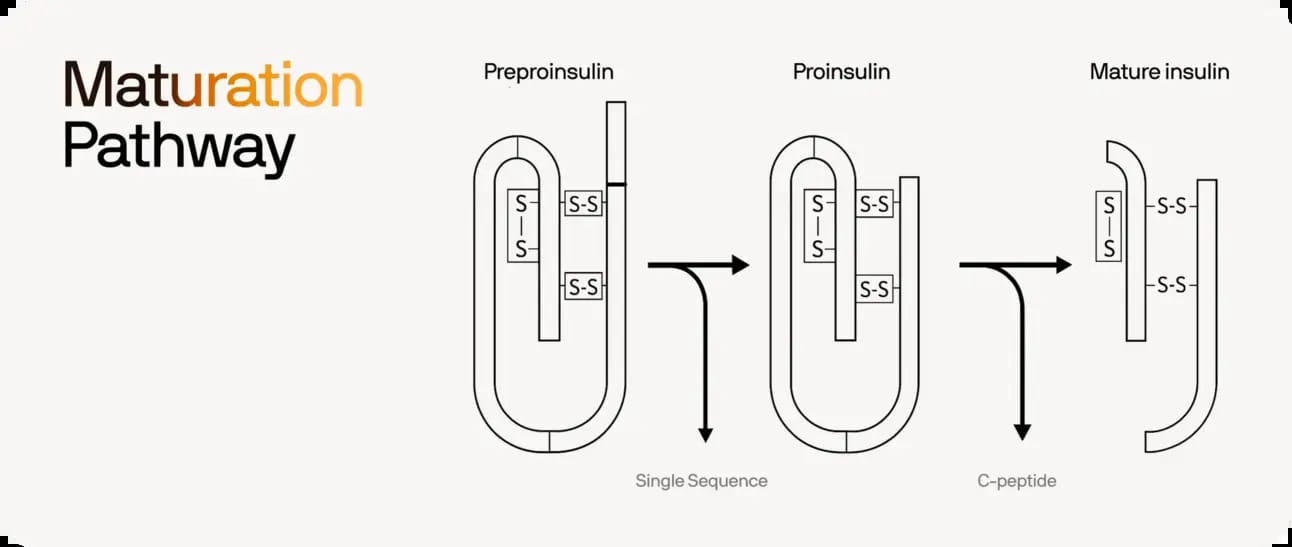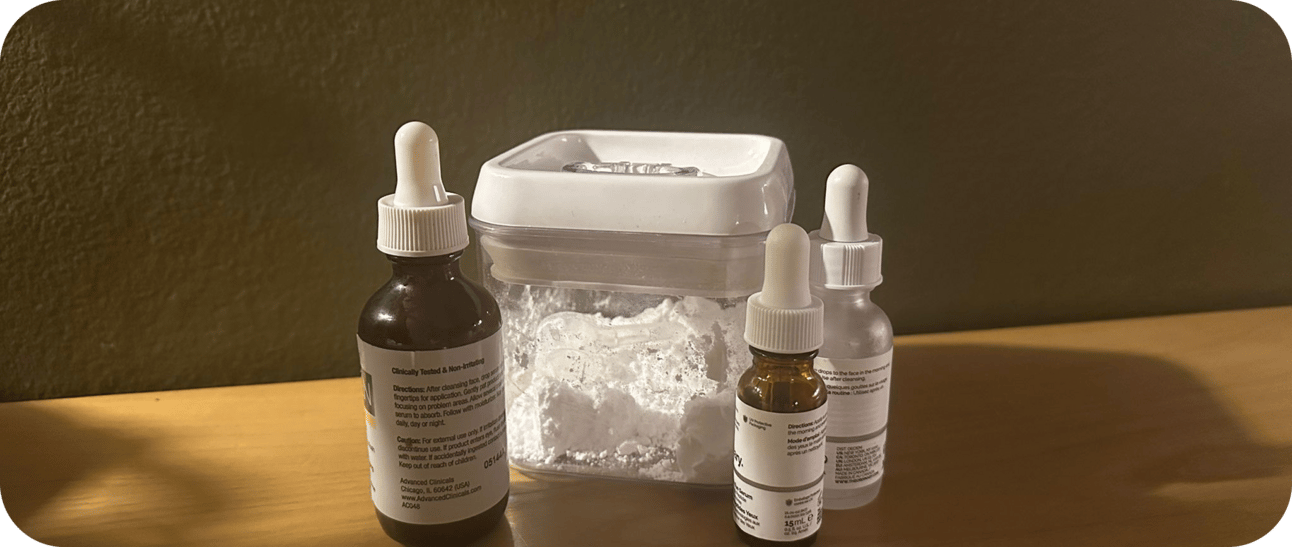- Superpower Journal
- Posts
- Everyone’s on peptides. Should you be too?
Everyone’s on peptides. Should you be too?
Everyone’s buzzing, but most doctors still don’t prescribe them. So what's science and what's a scam?

Read time: 5 mins
The other day in my local coffee shop, a man told me how he avoided major shoulder surgery by using peptides.
He wasn’t a tech founder, or a biohacker.
He was a retired plumber. A grandad.
I walked away with two thoughts:
"Aren’t peptides some internet scam?"
"Wait, am I the only one who doesn't even know what peptides are?"
Ozempic splits opinions. Insulin is proven. Semaglutide too.
And over 80 peptides are already FDA-approved.
But peptides like BPC-157 or Epitalon? We’re still waiting on large clinical trials and FDA sign-off.
So let’s stay curious.
But Tash, why aren’t peptides super mainstream, if they are a miracle cure?
Ah, great question!
Let’s breakdown what peptides are, how they are effective and why peptides aren’t (yet) in everyone’s medicine cabinet.
Why everyone suddenly cares about peptides
Peptides are having their moment.
Heard of GLP-1? Maybe not.
But I bet you know its brand name: Ozempic.
Celebrities use peptides to drop weight fast. Weekend warriors use them to bounce back from injury quicker.
But here's the surprise: peptides aren’t new. And you've probably already used them without realizing.
And guess what? Your body makes peptides naturally!
Ever used hydrolyzed collagen for skin or nails? That's a peptide.
Insulin, a lifesaver for type 1 diabetes for over a century1 , is a peptide.
Know someone who’s given birth? Their body naturally releases oxytocin (a peptide) to trigger contractions. Doctors use a synthetic version called Pitocin to help labor along2 .
Over 80 approved peptide drugs already exist. But lately, peptides are capturing attention for tackling aging, boosting immunity, sharpening the brain, accelerating healing, and enhancing performance.
Whether identical to natural human proteins, slightly modified, or derived from non-human sources, therapeutic peptides continue to deliver promising results in laboratories and clinical settings (though more research still needs to be done).
So what actually are they?
What actually is a peptide?
Peptides are short chains of amino acids, typically between 2 and 50, that your body uses as messengers.
Amino acids are like letters.
Peptides? Short words.
Proteins? Full sentences or even paragraphs.
An example:
Proinsulin, a precursor hormone that gets converted into insulin within the body, has 86 amino acids (so classified as a protein).
Your body then splits it into Insulin (51 amino acids, so a peptide or small protein) and then into C-peptide (31 amino acids, clearly a peptide).

Just like insulin, your body naturally makes hundreds of peptides, each with a unique job:
These peptides act as small, precise signals directing cells to start or stop important processes like inflammation, hormone release, or tissue repair.
Synthetic peptides (analogs) are simply modified natural peptides.
For example, after eating, your body produces a peptide called GLP-1 to control blood sugar and appetite.
But there's a catch: natural GLP-1 vanishes from your system in minutes.
So scientists developed GLP-1 analogs (like Semaglutide6 ). These are modified versions of natural peptides designed to last longer and work better.
Whether natural or synthetic, peptides deliver precise instructions.
So while your body naturally produces peptides, this can decline as you age. That's where peptide therapy helps.
Peptide therapy enhances your body's functions and helps achieve targeted health goals.
And because peptides are highly targeted, they're often safer and more effective than traditional drugs.

Are peptides safe and effective?
Generally, yes - many peptides are safe and well tolerated, especially those that mimic natural compounds the body already produces.
But like all therapies, they carry some risks and must be evaluated on a case-by-case basis.
Peptides, however, hit a "Goldilocks zone" in drug design: Large enough to be biologically specific, yet small enough to avoid triggering strong immune responses or toxic buildup7.
That means fewer side effects, from simple skincare treatments to complicated therapies for cancers and metabolic disorders.
This is because:
They’re broken down into amino acids: Most peptides are metabolized into harmless amino acids, placing less burden on detox organs like the liver and kidneys10 .
Note that even while metabolized into amino acids, some peptides can still stress organs (e.g., kidney damage or impaired function with high-dose cisplatin11).
They’re highly specific: Peptides often bind only to their intended receptors, leading to fewer off-target effects than many small-molecule drugs12 .
Lutathera, a peptide drug that targets tumors, stopped cancer growth for 23 months, almost three times longer than the 8.5 months seen with standard treatments. Main side effects? Usually mild, like nausea13.
They can reach places large biologics can’t: Antibodies are large and often struggle to penetrate dense tissues or cross barriers like the blood-brain barrier. Peptides, being smaller, can access tightly packed or intracellular targets14 .
They rarely trigger immune reactions: Therapeutic peptides are small and closely match peptides your body naturally makes. This means your immune system usually accepts them easily, causing fewer reactions1516- though exceptions exist.
They can engage complex, hard-to-drug targets: Peptides can influence how proteins interact, something traditional drugs and antibodies often struggle to do17 .
Some peptides, like the popular BPC-157, help repair tissue by promoting angiogenesis (the growth of new blood vessels). But scientists wonder: could this also speed up tumor growth? There's no direct clinical proof yet, just cautious speculation.
Overall, peptides often outperform traditional drugs in safety and effectiveness.
So, which peptides (both FDA-approved and up-and-coming) deserve your attention?
5 peptides worth your attention
These peptides are creating buzz. Some are currently FDA approved, and others still early days. Here’s the quick rundown:
BPC-157 (Body Protection Compound-157):
Speeds up healing, fights inflammation, and repairs muscles, tendons, and gut lining. Early human trials show promise, especially for gut conditions like ulcerative colitis and multiple sclerosis where it showed no toxicity in patients18. Ongoing research explores brain injuries and tendon healing. (Not FDA-approved yet; experimental only.)
Semaglutide (GLP-1 peptide):
Controls blood sugar and significantly boosts weight loss: around 15% of body weight in 68-week trials19 . (FDA-approved for diabetes and weight management, with studies ongoing for heart health and neuroprotective benefits20).
Thymosin Alpha-1 (TA1):
TA1 primarily strengthens your immune system. It boosts your T-cells21 , helping them mature and activates immune cells to fight infections and cancer22 . (It is FDA-approved to treat hepatitis B and C, to boost immunity during some cancer treatments, and has been studied in limited trials. Cannot currently be compounded in the US).
Epitalon (Epithalon):
Linked to anti-aging effects, Epitalon may activate telomerase, an enzyme that protects DNA and supports healthy cell aging23 . Small European studies suggest benefits for telomere length, sleep, and immunity, but larger trials are needed. (While not FDA-approved as a drug, it’s allowed for compounding under 503A Category 2, an internal FDA designation for certain custom-prescribed peptides).
Tesamorelin (Growth hormone peptide):
Boosts growth hormone, cuts belly fat24 , and may sharpen your memory25 . (FDA-approved for HIV-related belly fat reduction).
Why are peptides not prescribed everywhere?
Peptides are blowing up in wellness and anti-aging circles, but most traditional doctors still aren't prescribing them.
Medical schools don’t teach peptide therapy. Doctors who do prescribe peptides, usually "functional" or "integrative" specialists, had to learn it all themselves.
Peptides live in regulatory limbo.
Peptides sit between drugs and supplements. Too complex for supplements, yet not FDA-approved as standard drugs26 , so most pharmacies don’t stock them, and doctors rarely prescribe. But we are seeing progress in the field27!
Pharma companies ignore peptides.
Peptides are often identical to natural human proteins or discovered long ago and openly published. That means no patents, no exclusivity, and no guaranteed profits for Big Pharma.
Peptides need big studies. But no one’s funding them.
Newer peptides rarely undergo large clinical trials doctors trust. Evidence for many promising peptides (like BPC-157) comes from small human studies or animal experiments, leaving unanswered questions about long-term safety.
Western medicine doesn’t trust peptides. Yet.
Many peptides (like BPC-157 or Epitalon) gained popularity without large, rigorous Phase III clinical trials, some relying instead on limited early-stage studies. Combined with research language barriers and some high-profile internet scams involving these peptides in the US, this understandably makes doctors hesitant to embrace them fully.

Me: not into peptides.
Also me: accidentally stockpiled them in my bathroom and pantry without even realizing 🤷🏻♀️
So, should you try peptides?
Peptides are exciting. And we're just getting started.
Skepticism makes sense. But early studies (and plenty of real-world results) show peptides have huge potential: faster healing, graceful aging, sharper performance.
As science and public acceptance catches up, expect peptides in medicine cabinets everywhere.
Curious? Stick around. We'll keep diving into peptide breakthroughs and share simple insights you can use.
Want more specific peptide deep-dives or have your own story to share?
Hit reply 👀 I read every message.

Enjoyed this email?
Forward it to a friend or colleague who might find it valuable. Or share the signup link so they can join us directly!
We’re all about getting better.
Got thoughts, feedback, or ideas? Hit reply and let us know – we’re listening!
DISCLAIMER: The information provided in this newsletter is for educational purposes only and is not a substitute for professional medical advice, diagnosis, or treatment. Always consult your healthcare provider before making any changes to your health or wellness routine.